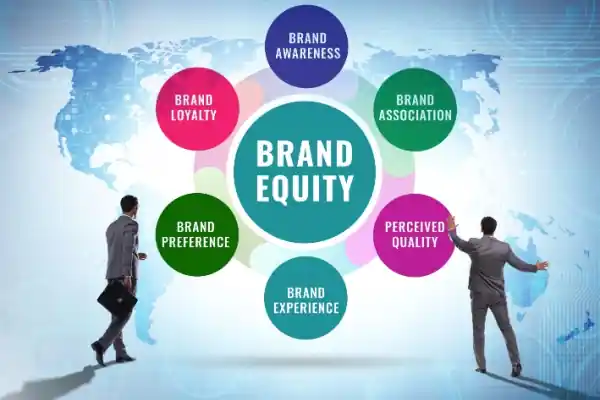
Brand equity is crucial in marketing. It’s all about the extra value your brand gives to what you’re selling. This extra value comes from how people see and experience your brand. Understanding brand equity is helpful for businesses. It’s all about making and checking your brand’s value. Things like how well-known your brand is, if people are loyal to it, and how they feel when they interact with it are all important. These things can make this kind of equity good or bad.
We’re going to talk about how brand awareness is different from brand equity. We’ll look at how brand equity can grow organically and how businesses create it. Knowing how to measure your brand’s equity is also important because it shows how people’s views can make a difference in how much money you make. We’ll show you examples of companies from around the world and in India that have great brand equity. By the end of this, you’ll get why this kind of equity is so key. You’ll see how it helps businesses succeed and how it affects the way customers feel about them. Let’s dive in and learn all about brand equity and its impact!

What is Brand Equity?
Brand equity represents the value of a brand and its products in the market and in the minds of consumers. It’s about how people feel when they think about a brand. This feeling comes from their brand experience and customer experience. Building brand equity is crucial for companies. It involves creating a strong brand identity and increasing brand awareness. Brand loyalty is a key part of this process. When customers keep choosing the same brand, that’s brand loyalty. Measuring and managing it helps businesses understand how much their brand is worth. It’s like taking a snapshot of the brand’s health. So, this kind of equity is crucial. It shows if a brand is strong and loved by its customers.

Benefits of Brand Equity
Brand equity is more than just a marketing term; it’s a comprehensive measure of a brand’s power in the marketplace, reflecting how customers perceive and value the brand. This exploration will delve into the multifaceted benefits of brand equity, illustrating its impact on various aspects of a business. Let’s look at these 15 key advantages of brand equity, each explained in simple terms.
1. Brand Loyalty
When customers develop a strong connection with a brand, they become loyal, consistently choosing that brand over others. This loyalty isn’t just about repeat purchases; it’s about customers becoming advocates, and spreading positive word-of-mouth that attracts new buyers. This loyalty cycle is a fundamental aspect of building brand equity, reinforcing the brand’s presence and influence in the market.
2. Brand Value
The financial worth of a brand—its brand value—increases with its equity. This is crucial for companies considering the sale or valuation of their brand. Strong brand equity enhances a brand’s attractiveness to potential buyers or investors, reflecting its market strength and potential for future earnings.
3. Customer Retention
Retaining customers is easier for brands with strong equity, as they’ve built a foundation of trust and perceived quality. These brands deliver consistent, positive experiences, encouraging customers to stay loyal over time. High customer retention rates signal a strong brand presence and are crucial for achieving sustained business success.
4. Attracting Talent
Brands with high equity don’t just appeal to customers; they attract top talent too. People want to work for brands that are well-regarded and stable. Employees are proud to associate with these brands, which helps companies retain skilled workers, fostering a more productive and innovative work environment.
5. Financial Performance
A strong brand equity is linked to superior financial performance. It can lead to increased sales, higher profit margins, and expansion opportunities. A well-established brand can leverage its equity to enter new markets and introduce new products with a higher success rate.
6. Resilience to Negative Exposure
Brands with solid equity have a buffer against negative publicity. Their established positive consumer perception and customer loyalty can help them navigate through tough times more effectively than brands with weaker equity. This resilience is crucial for maintaining customer trust and business stability.
7. Enhanced Customer Experience
Positive brand equity enhances the customer experience, creating a virtuous cycle where improved experiences boost equity even further. When customers have positive interactions with a brand, they are more likely to return and recommend the brand to others, amplifying its equity.
8. Understanding Public Perception
Knowing how the public perceives a brand is vital for managing brand equity. This understanding can influence marketing strategies, product development, and customer engagement, ensuring that the brand aligns with consumer expectations and values.
9. Communicating Brand Beliefs
A brand’s values and beliefs are essential components of its identity. Effectively communicating these aspects can strengthen brand equity by resonating with customers and differentiating the brand in the market. This alignment between brand messages and consumer values fosters deeper connections.
10.Customer Advocacy
Strong brand equity results in customer advocacy, where loyal customers actively promote the brand. This advocacy is a powerful form of marketing, as personal recommendations often carry more weight than traditional advertising, expanding the brand’s reach and influence.
11. Perceived Quality
Customers associate strong brand equity with high quality. This perception allows brands to command higher prices and customers are often willing to pay more for products from a brand they trust, which can lead to increased profit margins.
12. Brand Preference
Brand preference is a direct outcome of strong brand equity. Customers are more likely to choose a brand they recognize and trust over competitors, even if alternatives are available at a lower price or with similar features.
13. Market Share Increase
A natural consequence of building this kind of equity is an increase in market share. As more consumers choose the brand over competitors, its share of the market grows, which can further enhance its visibility and influence.
14. Organic Growth
Brands with strong equity experience organic growth as their recognition and customer base expand naturally. Satisfied customers become brand ambassadors, recommending the brand to others and driving new customer acquisition without the need for additional marketing efforts.
15. Value-Based Selling
Brands with high equity can focus on value-based selling rather than competing on price. Customers are drawn to the brand for its perceived value, including quality, customer service, and brand experience, which can lead to sustained business growth and profitability.
In essence, brand equity is a pivotal element in a company’s success, influencing customer behavior, financial performance, and competitive standing. The highlighted benefits emphasize the need to build and uphold a strong brand identity. This effort not only improves a brand’s standing in the market but also boosts customer loyalty. It encourages growth and strengthens the brand’s ability to withstand challenges.

Brand Awareness vs. Brand Equity: What’s the Difference?
Brand equity and brand awareness are two important ideas in branding, but they’re different. Understanding their differences is essential for effective brand management.
Brand Awareness is the extent to which consumers are familiar with your brand. It’s about whether people know your brand exists and can recall or recognize it when prompted. It’s like being famous among customers; they know who you are. This is super important because it’s the first step in getting people interested in what you sell.
Brand Equity is more about how much people like and value your brand. It’s not only about knowing the brand; it’s about what people think and feel about it. If people have good experiences and thoughts about your brand, you have positive brand equity. This can make customers stick with you, tell their friends about you, and even pay more for your products. But if people think ill about your brand, that’s negative brand equity, which isn’t good for business.
So, while brand awareness is about becoming known, brand equity is about being liked and valued. To have a strong brand, you need both: people need to know you and like you. When you build your brand, focus on several key aspects. Ensure you provide great experiences and make high-quality products. Also, maintain a good reputation. This approach will make people not only recognize your brand but also love it.
How does Brand Equity develop Organically?
Brand equity develops organically when people start to like and trust your brand. First, they learn about your brand and recognize it. Then, if they have good experiences with your products or services, they begin to prefer your brand over others. In the end, they become loyal and even suggest your brand to friends, which helps your brand grow even more.
Listening to what customers say is key to building this type of equity. For example, when Coca-Cola listened to its customers’ feedback on “New Coke,” the company showed it cared about what people think. This helped keep their brand strong.
To boost yours, you should know what your brand stands for, share what’s special about your products, and build good relationships with your customers. These steps make people loyal to your brand and strengthen your brand’s equity.
Brand equity is vital because it shapes how people see your brand’s value, affects how much they’re willing to pay, and builds loyalty. With time, consistently positive experiences and strong communication can grow your brand’s equity, making your business more successful.

Creating Brand Equity
Creating brand equity is a strategic process that involves building a positive image and reputation for your brand in the minds of consumers. This process is crucial for any business aiming to establish a strong presence in the market and gain a competitive edge. Let’s delve into how one can do this, through the following key steps:
Identify Your Purpose
Knowing why your brand exists is the foundation of brand equity. Your brand’s purpose and values should resonate with your audience. When customers understand and connect with your ‘why’, they form positive brand associations. This alignment between what your brand stands for and what your customers value creates a deep, meaningful connection.
Refine Your Brand Message
Your brand’s message should communicate what you offer and why it matters. Testing your messaging with a small audience can provide valuable feedback. Ensure your message resonates, is understood, and aligns with the perception of the brand you want to build. This step is crucial for shaping how people think and feel about your brand.
Boost Brand Visibility
To create brand equity, people need to know about your brand. Use various channels to increase visibility and make sure your brand is top of mind when customers are ready to make a purchase. Awareness campaigns, social media, and word-of-mouth are effective ways to get your brand noticed and remembered.
Ensure Consistent Branding
Consistency reinforces your brand’s identity and supports its reputation. Every interaction a customer has with your brand should reinforce the same values, quality, and experience. Consistency across all touchpoints, from product quality to customer service, builds trust and reinforces the positive perception of your brand.
Deliver Exceptional Customer Experiences
Exceptional customer experiences are at the heart of building brand equity. When customers have positive interactions with your brand, they are more likely to return and recommend it to others. Focus on delivering value, exceeding expectations, and addressing customer needs and feedback promptly.
It’s an ongoing process that requires a deep understanding of your brand’s purpose, consistent messaging and branding, visibility in the market, and a commitment to delivering outstanding customer experiences. By focusing on these areas, businesses can cultivate a strong, positive image that resonates with consumers, driving loyalty and long-term success.

Measuring Brand Equity
Evaluating consumer perceptions of your product’s value against competitors can shed light on your brand’s equity. This measurement can guide strategic decisions, helping to foster a successful brand. Here are some key methods you can use:
Financial Metrics
One way to measure brand equity is by analyzing financial data, such as the premium price customers are willing to pay for your brand over a generic or competitor’s product. This involves looking at sales figures, market share, and profit margins. A strong brand equity allows for higher pricing strategies, impacting the financial health of the business.
Assessing Product Value
Understanding how consumers perceive the value of your products compared to competitors can provide insights into this kind of equity. You can do this through customer surveys, focus groups, or analyzing consumer behavior and preferences. High perceived value often correlates with strong brand equity. This indicates that customers recognize and appreciate the distinct qualities of your brand.
Conducting a Brand Audit
A brand audit involves a thorough analysis of your brand’s position in the market. This includes examining its strengths, weaknesses, opportunities, and threats. This includes reviewing marketing strategies, communication materials, and customer interactions. A brand audit helps in understanding the current reputation of the brand and how it’s perceived internally and externally, offering a comprehensive view of this type of equity.
Brand Association – Keller’s Brand Equity Model
Using Keller’s Brand Equity Model can help figure out what people think and feel about your brand. This method checks on things like how loyal customers are, how well-known your brand is, its quality, and what people associate with it. These associations are key because they show how people connect with your brand, influencing what they buy and how loyal they are.
To measure and handle brand equity well, it’s vital to combine different methods like looking at your finances, understanding how people value your products, doing thorough brand check-ups, and studying how people link your brand with certain ideas or feelings. This combination helps businesses fully grasp their brand’s worth. In turn it enables them to make smart choices to boost and keep their brand’s value high in a competitive market.

Brand Equity’s Impact on Profit Margins
Brand equity is a critical asset that influences a company’s financial performance, particularly its profit margins. Here’s how it plays a pivotal role in enhancing a company’s profitability:
Boosts Order Value per Customer
High brand equity means customers trust and value your brand more. This leads them to spend more per purchase. When customers perceive a brand as superior or holding more value, they’re often willing to pay a premium price. This increases the average order value, which directly boosts profit margins.
Decreases Advertising Costs by Enhancing Reputation
A strong brand doesn’t need to spend as much on advertising to attract customers; its reputation precedes it. This reduction in advertising spend due to a well-established brand reputation means one can retain more money as profit. In turn, it enhances overall profit margins.
Increases Profit Margin
Brand equity lets companies set higher prices for what they sell. This is because people see their products or services as valuable and they’re loyal to the brand. When companies charge more, they make more profit. This is because the costs to make or deliver these products or services don’t go up as much as the prices do. So, the company earns more money.
Boosts Sales
High brand equity often results in increased sales because a trusted brand attracts more customers. When customers have positive brand attributes associated with a company, they’re more likely to choose that brand over competitors. This leads to a higher sales volume and improved profit margins.
Enhances Customer Retention
Maintaining existing customers is often less costly than acquiring new ones. Strong brand equity fosters loyalty, encouraging customers to stick with the brand. High customer retention rates contribute to stable revenue streams and, due to the reduced need for acquisition efforts, positively impact profit margins.
As you can see, brand equity is not just a marketing term. It’s a significant contributor to a company’s financial health. A successful brand that effectively manages and nurtures its reputation can reap significant financial rewards, including improved profit margins By focusing on building and maintaining strong brand attributes, companies can create a durable competitive advantage that translates into improved financial performance.
Examples of Companies with High Brand Equity
When we look at companies with strong brand equity, we find that their reputation and customer perception significantly contribute to their success. Here are three international and three Indian companies renowned for their positive brand equity:
International Companies
Apple
Known for its innovative products and strong customer loyalty, Apple tops the list with a brand value that reflects its dominant market position and consumer trust.
Microsoft
With a significant increase in brand value, Microsoft showcases robust brand equity through its widespread use in both consumer and enterprise sectors.
Amazon
Despite a modest increase, Amazon’s brand equity remains high, underpinned by its dominant position in e-commerce and expanding presence in other sectors.
Indian Companies
Tata Group
This conglomerate is celebrated for its diverse range of businesses and dedication to quality. Tata’s strong brand equity is built on its historical legacy and consistent delivery of reliable products and services.
Reliance Industries
A major player in India’s economy, Reliance is known for its rapid growth and innovation across various sectors. The company’s significant contributions to the economy and its dynamic approach to business have solidified its brand equity.
Infosys Limited
As a leader in technology services and consulting, Infosys demonstrates its brand equity through cutting-edge innovation and consistent performance. Its reputation as a trusted provider in the tech industry underscores its strong brand presence.
These Indian companies have effectively used their brand attributes to establish a positive image among consumers, boosting their profitability and market position. Brand equity is key for these companies, as it shapes customer choices, supports premium pricing strategies, and nurtures loyalty, all of which directly influence their profit margins and sustainable success.

Boost Your Brand Equity with Synapse
Brand equity significantly impacts a company’s profitability by allowing higher pricing, boosting sales, reducing marketing costs, enhancing customer loyalty, and increasing the average order value. These factors collectively contribute to a robust profit margin, showcasing the financial importance of strong brand equity.
If you’re looking to build or enhance your brand’s equity, consider partnering with Synapse, one of India’s oldest and most respected branding and communication design agencies. With years of experience and a track record of success, we can help elevate your brand’s market position. Visit our Showcase page to explore the impactful work we’ve done over the last few years, and see how we can contribute to your brand’s success. Let Synapse guide you in creating a brand that resonates deeply with your audience and stands out in today’s competitive market.
Give us a call at 1800 121 5955 (India) or email at contact@synapse.co for more information. We’re also available on WhatsApp or you can fill in the Contact Form when you visit the website.







